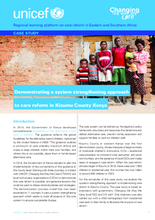In 2014, the Government of Kenya developed comprehensive guidelines on the alternative family care of children. The guidance reflects the global Guidelines for the alternative care of children, welcomed by the United Nations in 2009. This guidance outlines a continuum of care whereby maximum efforts are made to keep children within their own families, and where this is not possible, place them in family-based alternative care.
In 2018, the Government of Kenya decided to pilot the implementation of key components of this guidance at the county level. Starting with three counties, it worked with UNICEF, Changing the Way We Care (CTWWC) and local civil society organisations (CSOs) to demonstrate that care reform is possible, and generate lessons that could be used to shape national policies and strategies. The demonstration counties model has now been expanded to 11 counties. It uses a system strengthening approach which seeks to build all aspects of the care system to ensure sustainable change.
The care system can be defined as: the legal and policy framework, structures and resources that determine and deliver alternative care, prevent family separation and support families to care for children well.
Kisumu County in western Kenya was the first demonstration county, chosen because of large numbers of charitable children’s institutions (CCIs – residential care providers), its mixture of rural, peri-urban, and urban communities, and the presence of local CSOs and media ready to engage in care reform. When the care reform process began in Kisumu in 2018, there were over 1,800 children in residential care; this number has now fallen to around 600 children in 2023.
For the remainder of this case study, the authors explore the systems strengthening approach to implementing care reform in Kisumu County. The case study is based on interviews with government, Changing the Way We Care, local CSO and CCI staff. One interview was also carried out with a child reintegrated from residential care back to their family to illustrate the impacts of care reform.

